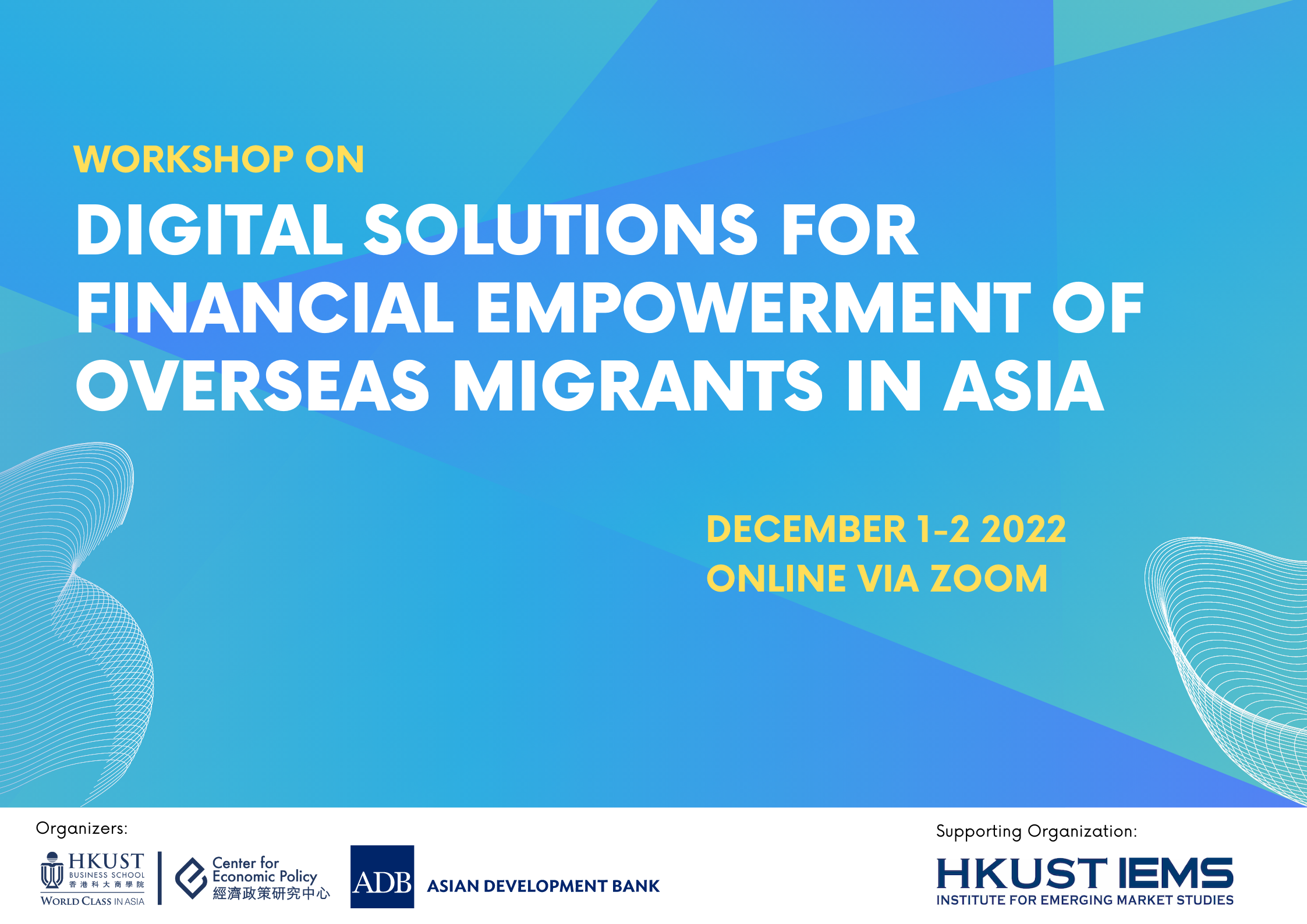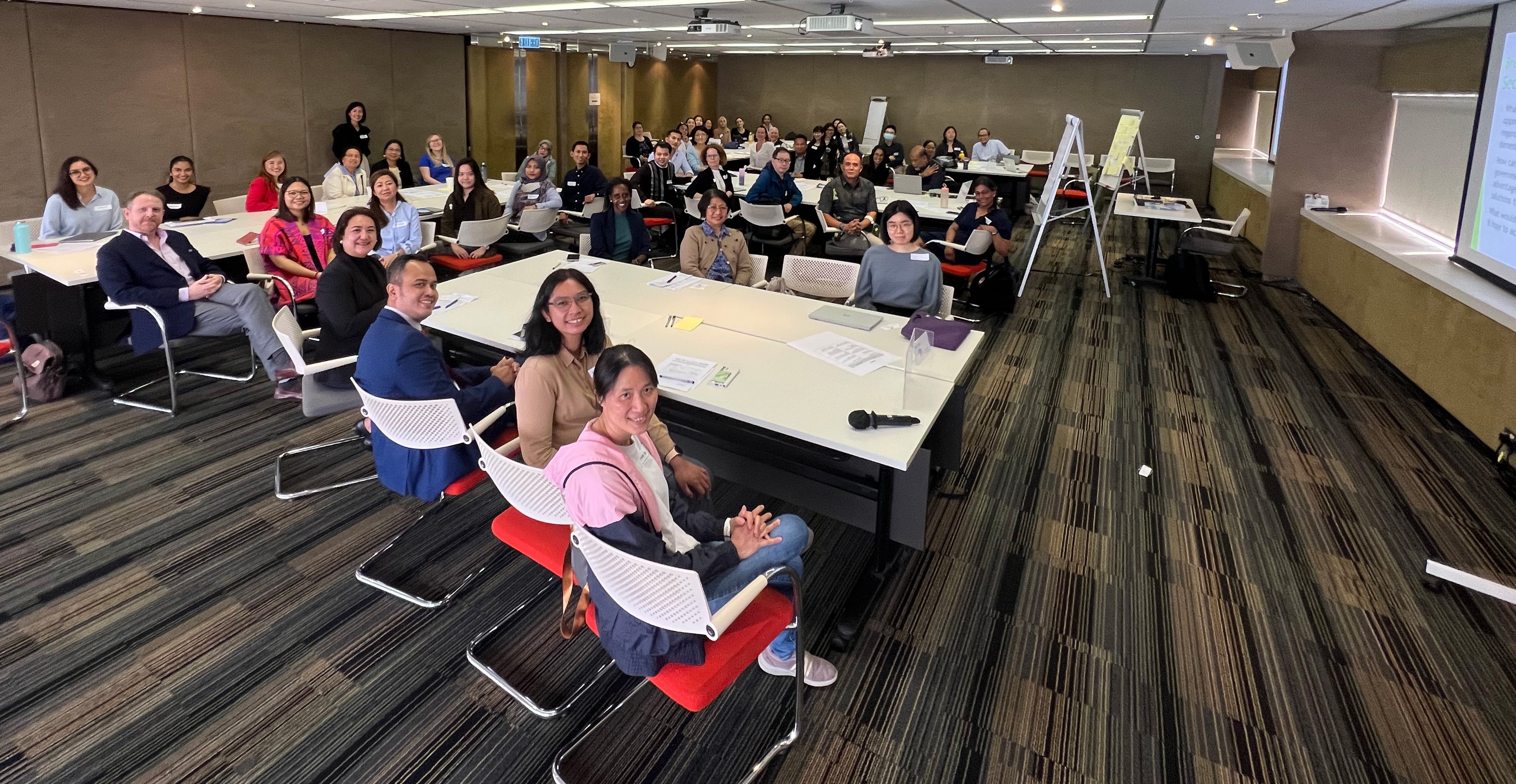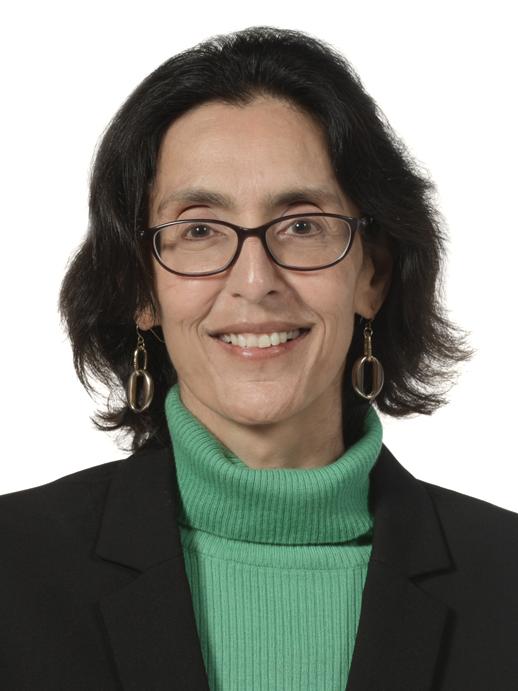Digital Solutions for Financial Empowerment of Overseas Migrants in Asia
- Various
- 2022-12-01 ~ 2022-12-02
- 8:15am - 5:00pm
Videos
Video recordings of the workshop are now available here.
Program
Program of the event can be found here.
Summary of the workshop
Nearly 90 million international migrants are sourced from the Asia Pacific region. Remittances are an important source of income for transnational families, and help finance education, medical treatment, and socio-economic mobility. At the same time, many migrant workers remain vulnerable to economic shocks and pressure, struggle to finance their migration and suffer from a lack of job security and indebtedness. We also have little evidence on how well they succeed at achieving their migration goals.
This two-day online workshop brought together researchers and practitioners working toward the financial empowerment of overseas migrants in Asia. It aimed to start a discussion about what we can learn from existing research and practice, and how this can inform the design of new interventions and future research. A specific emphasis was on understanding if and how digital services and technologies can address key challenges that migrants face.
Workshop co-host Aiko Kikkawa, presented a review of the landscape of “migtech”, including migrants’ access to mobile devices, and the digital tools that have emerged over the recent years. In addition to digitals remittance transfer and payments solutions, new solutions have been developed to provide migrants at various stages of the migration cycle with information, support services, financial literacy and skills training. She argued that migtech solutions have the potential to empower migrants through improved awareness of migration risks and opportunities and understanding of their rights, as well as building social cohesion. However, there remain challenges in maintaining data privacy and security, ensuring that these channels do not promote irregular migration, and in overcoming the digital divide in access to technology.
Participants also heard from Jonathan Capal, the Founder and Chief of Global Programs for the migration and remittance consulting firm, SaverGlobal. Their mobile platform SaverAsia, covers 42 remittance corridors in Asia and provides a range of free informational resources aimed at facilitating an informed choice toward formal remittances and financial inclusion, helping migrants avoid abuse and exploitation. A particularly impactful tool is the overtime calculator for Malaysia, developed in collaboration with the ILO, which allows migrants to calculate their wages and check if they are being paid correctly, empowering them to negotiate with employers and claim their rightful dues.
In comparison, financial training programmes are traditionally significantly more time-intensive for migrants to attend, but even those are increasingly leveraging digital technology. Uplifters’ programmes, targeted at migrant domestic workers in Hong Kong and Singapore, are a pioneer in this area, in that they were conceptualised to be online from the get-go. Their training modules, which aim to both provide money management skills and promote personal growth, are easily accessible through Facebook, have low bandwidth requirements, and are organised in bite-sized chunks so to enable self-paced learning. Camille Bethoux also emphasised the complementary peer support that Uplifters provides via moderated chat groups, to ensure high motivation and programme completion.
In the last few years, the pandemic has also caused other traditionally in-person training programmes to go online. Financial literacy education has long been part of the ILO’s initiatives for migrant workers, but in recent years the training has become hybrid (mixed online and off-line). Catherine Laws of the ILO emphasised however that in-person training and participatory approaches remain crucial to maintaining engagement and providing effective learning in migrant communities. For example, although Atikha has embraced digital methods of providing training remotely, it continues to advocate for heavier-touch interventions, such as involving family members in the financial empowerment discussion, repeated follow-up with programme participants and integrated approaches that include both financial education and access to financial services and government programmes.
Participants also heard from researchers working on questions related to financial education and services, and how these related to migrants’ remittances, saving, borrowing and entrepreneurship. Juyoung Jang from the Migration Research & Training Center in South Korea presented evidence from an exploratory study among Filipino migrants in South Korea, highlighting that migrants often have limited understanding of complex financial concepts, and report vague financial goals, making it harder to achieve their self-reported aspirations of starting businesses. The PEAK Pinoy programme recently launched by the Embassy of the Philippines in South Korea is addressing this gap through online and offline seminars on business opportunities in different regions in the Philippines, personal development and business plan writing.
Scholars Fenella Carpena and Nobuyuki Nakamura presented results of their academic work aimed at understanding the drivers of migrants’ financial behaviour. Nakamura and co-author Aya Suzuki examined the remittance patterns of foreign care workers in Japan during the recent pandemic and found suggestive evidence that remittances may be driven mainly by altruism. Taking advantage of the fact that many origin countries implemented pandemic-related grants, he was able to see whether migrants adjusted their remittances downward when family members had these other sources of income. Instead, he found that workers’ remittances responded to their own receipt of pandemic-related subsidies from the Japanese government, and that those who had high measured proxies of altruism were particularly likely to remit more.
Carpena’s presentation was particularly relevant to a key question in the financial education literature, viz. understanding why many financial literacy programmes have only mixed success at changing financial behaviour. Using data from an experiment in India, Carpena & co-author Bilal Zia investigated the mechanisms by which behavioural change took place. By disentangling measured financial knowledge into different sub-components: numeracy, awareness and attitudes, they show that in their experiment, changes in financial numeracy did not predict changes in financial behaviour. Instead, improved financial awareness and attitudes were both likely to increase participants’ budgeting behaviour. However, they argue that to induce change in financial outcomes, such as increasing savings, it is crucial to change participants’ financial attitudes.
Attitudes and constraints to financial management were also a focus of workshop co-host and CEP director Sujata Visaria’s presentation of findings from her research on Filipina domestic workers in Hong Kong. She argued that migrants’ choices about whether to finance investments through saving or through borrowing (and therefore at higher cost) may be driven by their relationships with their families. In particular, those who face excessive demands from their social network may prefer to take a loan and then use the repayment obligation as a device to deflect further family requests for money. At the same time however, if loans are easily obtained and require no collateral, then these family members may also continuously demand that migrants take on more debt – thus access to easy borrowing may in fact be a double-edged sword. Instead, digital technology could be used to develop new financial products that provide this financial discipline at a lower cost, allowing migrants to avoid high-interest borrowing. Panelist Erwin Tiongson provided examples of products that are both flexible and provide financial discipline, such as the Chilean portable social protection scheme, and the Edupay intervention that allowed migrants to directly pay their children’s school fees from abroad, thus providing them with more control over how their incomes were spent.
While digital solutions are powerful, their effectiveness is also limited by other hard constraints. These include, as Catherine Laws of the ILO pointed out, migrants’ limited access to mobile phones in general, and smartphones in particular, the use of legacy software, lack of literacy, and language barriers. Uplifters’ experience also highlights the costs of piggybacking on popular platforms such as Facebook: they must constantly modify their provision to keep up with changing platform features. Similarly, while remittances are increasingly more likely to be digitally-initiated, many recipients still convert them into cash before spending, incurring transactions charges in the process. Several practitioners also argued that low-skilled migrant workers have too many demands on their time to participate fully in online-only programmes, and that face-to-face interaction will continue to be important for building sustained engagement.
Panelist Kimberly Wilson argued that migrants need basic rights and certain minimum income levels before digital financial solutions can be appropriate and helpful. Regulations in the destination often bar migrants’ access to certain financial products: correcting this inequality could arguably go a long way in improving migrant financial health.
The workshop closed with participants expressing interest in continued engagement. As the Asian Development Bank launches its new project titled “Remittances for Inclusive Development: Improving Data and Analysis on the Financial Literacy and Inclusion of Migrants and their Families in Selected Southeast Asian Countries”, the Center for Economic Policy hopes to provide a platform for dialogue and collaboration.










